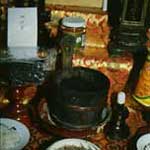Home > Teach me Tea Cha! > Culture > Buddhism and Tea
Main content starts here.
Buddhism and Tea


Buddhism and tea are tightly entwined. How tea effect your body and mind and the path of tea went through in Japan both have something to do with Buddhism. Green tea was first brought by the monks who went to China to study Buddhism such as Youchyu(743-822) Saicyou(767-822) and Kukai(774-835). They introduced the way of drink "Mochicha" which was steamed and compressed green tea. They were started be drank at the imperial palace and temples. Eisai(1141-1215) is known to be a Japanese Buddhist priest who first introduced "matcha (powdered green tea)" to Japan. He was also a founder of the Rinzai sect of Zen Buddhism and upon his return from study in China during the Sung dynasty, he brought this powdered green tea. Tea was first used as natural medicine by Buddhist monks. They used during the meditation to fight to stay awake. Eisai wrote a book about the remarkable medicinal effects of tea "Kissa Youseiki". Tea and the manner of drinking was also officially introduced in the book "Eiheiseki" which is regarding ideal life style of monks. Tea was started be sold at the temples, and its positive effects on one's body and mind became well known. During the Sengoku era, the new style of way of Tea, WABICHA, which was combined the Zen philosophy into the way of tea, was established. Prominent Tea masters were also practiced Zen mind and strongly related to the temples. During the Edo era, the Chinese Buddhist priest "Ingen"(1592-1673) who was a mission of Oubukusou, introduced the Ming style of serving and drinking tea which became the base of Sencha-do today. Even now, tea is playing an important role in various Buddhist ceremonies. Tea is also used for the gifts for the attendants of the funerals.
(Nobuyoshi Mochizuki)
